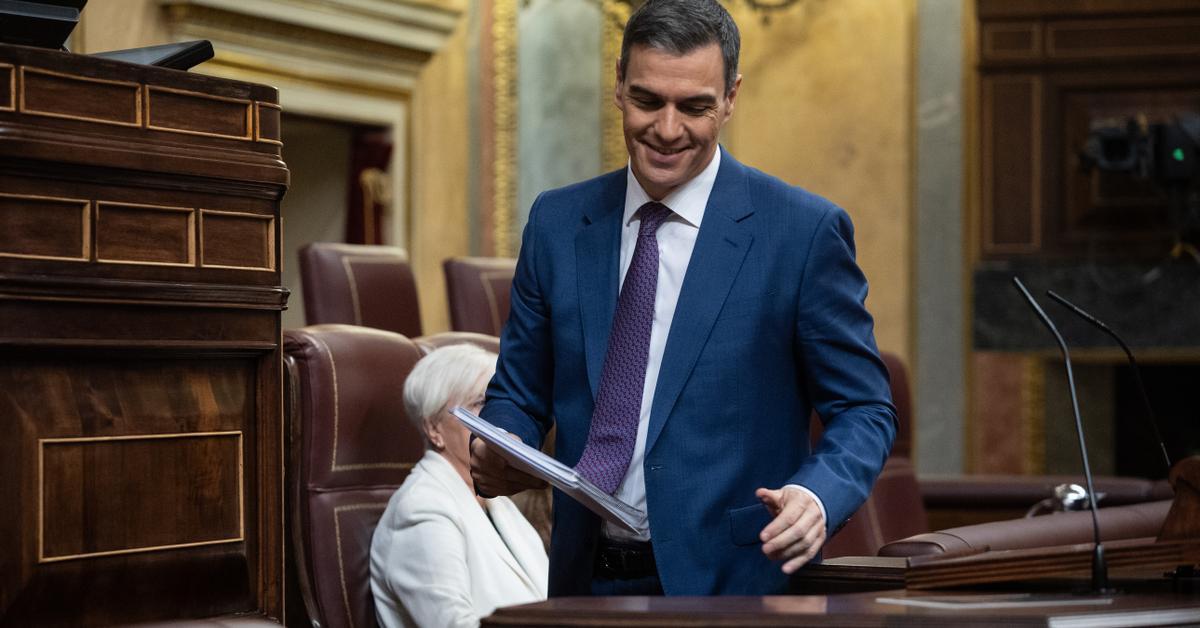
Fleas dream of buying a dog and nobodies dream of getting out of poverty (wrote Eduardo Galeano in the Book of Hugs), but here in Spain people are protesting because there is a parliamentary majority that they do not like, because they believe that Spain is breaking into pieces and because Pedro Sánchez has reached an agreement with the Catalan independentists to promote an amnesty law that turns the page on the process . More out of the need for votes than out of conviction, since it has an undeniable history of contradictions. That’s right, but no one can maintain that the decision is not consistent with the pardons granted in the previous legislature. Nor is it that the newspaper library can disappoint politicians of all stripes or that the transfer is not part of the culture of any pact.
If Aitor Esteban spoke, as he himself said this Wednesday from the Congress rostrum, or if Puigdemont’s men did so to tell how, when and what the PP offered them to invest Feijóo, that angry mass that today shouts, insults and accuses Pedro Sánchez of being a traitor and dictator, he would not set the street on fire. Nor would the PP point out from its social networks one by one the deputies who have voted yes in an investiture proposed by Felipe VI, with a campaign of harassment unlike anything remembered in democracy.
Despite the sound, the fury or the fifty Francoist soldiers who have signed a manifesto to call for an Army coup that removes a democratically elected candidate from the presidency, Sánchez has become one of the few progressive presidents there are today. in Europe, a framework where his career is recognized at a much higher level than that granted to him in Spain. Here, in fact, after 28M, when the PP won the municipal and regional elections, not even his people gave a euro for his continuity at the head of the Government.
He has done it again. Against all odds and with all powers that be against. It is not the first time, although on this occasion the virulence of the political, media, judicial, business and even media right has crossed limits hitherto unexplored because they assumed that a right-wing government would emerge from 23J. That is why the XV Legislature begins, in addition to an excess of decibels, with a parliamentary majority made up of allies from very different sides and complicated for the socialists to manage. On the one hand, the competition between the PNV and Bildu a few months before the Basque elections. On the other hand, the rivalry between Junts and ERC. And if that were not enough, the tension that exists on the left of the PSOE between Sumar (his coalition partner) and the party founded by Pablo Iglesias. The latest struggle for the distribution of ministerial portfolios is embarrassing and inappropriate for formations with a minimum of political culture or sense of institutionality.
With this panorama, it is not surprising that Sánchez has decided to give one more look to the organization chart and the names that will make up the new government. The president maintains the tension after commenting with his collaborators that there are aspects that still have to be addressed to close an Executive that, in principle, will have fewer portfolios than the current one and for which he wants names with a marked political profile. .
The unquestionable and the fixed exits
Except for the fixed pieces that no one questions, such as Félix Bolaños, María Jesús Montero, Teresa Ribera and Yolanda Díaz, the rest of the ministers live in a ‘woe’ waiting for the presidential call to find out if they keep their position or will leave. There are no doubts about the departure of Pilar Llop (Justice), Raquel Sánchez (Transport), Ione Belarra (Social Affairs), Irene Montero (Equality), Alberto Garzón (Consumer), Miquel Iceta (Culture) and José Manuel Miñones (Health ). The rest of the possible casualties or new additions are speculations because the president has only shared the names of a couple of people in his circle of trust – not even with all his collaborators – who are as secretive as him and know that a single leak can cause for Sánchez to change his plans.
A new boost to the PSOE in the territories
The one that is starting is not just any legislature and Sánchez prefers to rethink the changes that he had in mind for days and that, for whatever reason, do not quite fit. In addition to the design of the Government, the president already plans to give new impetus to the PSOE, and has given instructions to begin work on the strengthening of some territories and on some replacements at the head of the general secretariats. Extremadura, Aragón and Valencia are already in it, but Sánchez is thinking about other federations where he believes it is necessary for there to be changes in the organic leadership sooner rather than later with an eye on the regional elections in 2027.

All this, while Yolanda Díaz, his coalition partner, has been thinking for some time about how to fit all the pieces of his political space into a small number of ministries. A puzzle that has been changing in recent weeks depending on the negotiations with Pedro Sánchez. The drawing of Sumar’s quota in the Government was more or less defined on Friday, after the vice president’s negotiating team maintained a round of contacts with all parties. Díaz and the President of the Government finished closing the details that day in the afternoon.
Everything indicates that Sumar will have five ministries. It seems certain that Díaz will maintain Labor and a vice presidency; that Más Madrid will take over the Health portfolio, which will go to Mónica García; The comuns will stay with Culture, which will be in the hands of Ernest Urtasun. Izquierda Unida will have a ministry, which would be for its spokesperson, Sira Rego; and a fifth portfolio will go to someone close to Díaz. All eyes point to former Podemos deputy Pablo Bustinduy.
On Friday, one of the unknowns that had been hanging over these negotiations for a long time was also cleared up: whether or not Podemos will be in the Government. Ione Belarra and Irene Montero had increased the pressure during the week of the investiture for their party to maintain a seat in the Council of Ministers. The ministers insisted on being part of the new coalition despite the fact that relations with Sumar have been practically broken for some time.
But the pressure did not come only from Podemos. Other important leaders in Sumar had also defended the presence of the party in the new Government, a claim joined by the Socialist Party, which fears a scenario for the legislature in which it will have to negotiate each law separately with the five deputies of We can, as those from Belarra have already warned. Without these votes, the Government cannot, for example, carry out initiatives that require an absolute majority. The concern goes even further when we think about the tactical alliance that the purples maintain with ERC and Bildu. The problem would no longer be 5 deputies, but 19.
On Friday, Díaz’s chief of staff and his main political negotiator, Josep Vendrell, held a meeting by video call with the Secretary of Podemos Organization, Lilith Verstrynge, who was traveling to Paris for a party event with left-wing MEPs. . Vendrell sent him a document, advanced by elDiario.es, for an agreement between the two political formations, in which Sumar offered Nacho Álvarez as Minister of Podemos. In exchange, those from Belarra had to sign another seven points that obliged the party to stop the “attacks and insults” against members of Sumar and to remain in the electoral coalition during the political cycle.
Until Friday, Álvarez was a member of the Podemos executive and has served as Secretary of State for Social Rights, under Belarra, throughout the legislature. He has been in Podemos since its birth, has written the economic points of almost all the electoral programs and has negotiated the budgets on behalf of Unidas Podemos since 2019.
Yolanda Díaz thought of him as a minister for two reasons: because of his intellectual worth and management capacity and also because she sees in him a conciliatory profile. These were also the reasons that led her to propose him as Sumar’s economic spokesperson during the electoral campaign and as the main negotiator of the Government agreement with the PSOE after 23J. That movement was seen in Podemos as a kind of betrayal and generated unrest in the leadership that has continued to this day.
Aware of the problems that assuming a ministerial portfolio could cause without the approval of his party, Álvarez told Díaz that he would not be a minister if Podemos did not accept him. That is the reason why on Friday he announced that he refused to be a minister and resigned from all of his positions in the party. He assured that he no longer had the trust of management.
I appreciate the trust that @Yolanda_Diaz_entrusts me, but I cannot accept being a Government Minister if the leadership of my organization does not approve it.
In my political culture it is not conceivable to accept a position outside the organization of which one is a part. pic.twitter.com/wTUvTqJ5Jj
— Nacho Álvarez (@nachoalvarez_) November 17, 2023
Podemos has been warning for weeks that Podemos ministers are chosen by the party. That is the answer that Verstrynge briefly conveyed to Vendrell in the call on Friday and that was the official response that Belarra published on her social networks: Montero must be Minister of Equality and the negotiations must be proposed without vetoes.
The document presented by Sumar felt very bad in the party. Not only because they demand to elect their ministers but because of the conditions that accompanied the text. “ Podemos undertakes to cease public attacks and insults against members of Sumar, including Yolanda Díaz,” the agreement proposal says. This reference to criticism and compliance with the agreements comes after months of clashes by Podemos against Díaz and Sumar, a party that its leaders have labeled as “docile” or “servile to the regime” left.
In Podemos they think that Sumar never had the will to negotiate his presence in the Government and that is why he proposed an “unacceptable” document a few hours after the closing of the negotiations and after months without responding to any of the political proposals that the party raised. for this investiture. Those around Yolanda Díaz maintain, however, that they did not rule out counteroffers to that document, if they thought that Álvarez was not the right figure, and that they could have valued them, but that no name other than Montero as head of Equality never came. a portfolio that everything indicates that this legislature will remain in socialist hands.
In meetings with the parties, Sumar proposed an agreement similar to the one he sent to Podemos, sources close to Díaz maintain, although only Belarra’s had a reference to the “insults and attacks” against members of Díaz’s platform. They also assure that the profiles of the ministers of each of the political forces that will be integrated into the Government were discussed with those same parties. Neither party believes there is any room for negotiation. Unless there is a major last-minute surprise, Podemos will remain outside the Government and will certainly deepen the path of distancing itself from Sumar.
Source: www.eldiario.es

